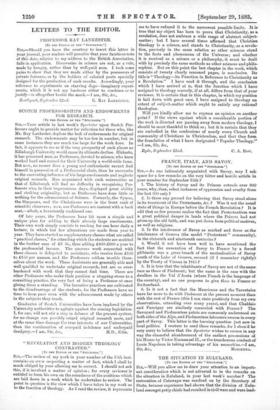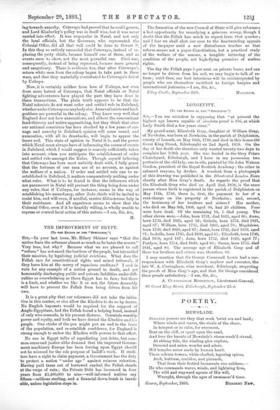THE SITUATION IN ZULULAND.
[To THE EDITOR or rug "SPECTATOR."]
Sts,—Will you allow me to draw your attention to an import- ant consideration which is not adverted to in the remarks on the situation in Zululand, in your last week's number ? The restoration of Cetewayo was resolved on by the Secretary of State, because experience had shown that the division of Zulu- land amongst petty chiefs had resulted in civil wars and wars lead- ing towards anarchy. Cetewayo had proved that be conli govern, and Lord Kiinberley's policy was in itself wise, but it was never -carried into effect. It was unpopular in Natal, and not only the local officials, but the Governor, who represented the Colonial Office, did all that well could be done to thwart if. In this they so entirely succeeded that Cetewayo, instead of re- placing the petty chiefs, became himself one of them, and as -events seem to show, not the most powerful one. Civil war, -consequently, instead of being repressed, became more general and sanguinary. There is evidence, too, that after Cetewayo's return white men from the colony began to take part in these wars, and that they materially contributed to Cetewayo's defeat Eby Usibepu.
Now, it is certainly neither from love of Usibepu, nor even from mere hatred of Cetewayo, that Natal officials or Natal fighting adventurers have played the part they have done in these transactions. The plain truth appears to be that the Natal colonists do not want order and settled rule in Zululand, whether under Cetewayo or anybody else. A nnexationists and land- grabbers are powerful in the colony. They know very well that England does not love annexations, and abhors the concomitant land-thievery and native-apprenticing, but they think that after -oar national conscience has been shocked by a few years of car- nage and anarchy in Zululand, opinion will come round, and -annexation, with all its drawbacks, will begin to appear the lesser evil. This state of opinion in Natal it ia, and the power which Natal must always have of influencing the course of events in Zululand, which I would suggest is scarcely sufficiently taken into account, when you anticipate the establishment of order and settled rule amongst the Zulus. Though myself believing that Cetewayo has been most unfairly dealt with, I fully grant that the fortunes of one man are of no account, as against the welfare of a nation. If order and settled rule can be re- -established in Zululand, it matters comparatively nothing under what ruler. What is to be feared is that the influences which are paramount in Natal will prevent the thing being done under any ruler, that if Usibepu, for instance, seems in the way of -establishing his ascendancy, other Zulu chiefs will be incited to resist him, and will even, if needful, receive filibusterous help in their resistance. Aud all experience seems to show that the Colonial Office, even if it be heartily willing, is wholly unable to wepress or control local action of this nature.-I am, Sir, &c.,
M.



































 Previous page
Previous page